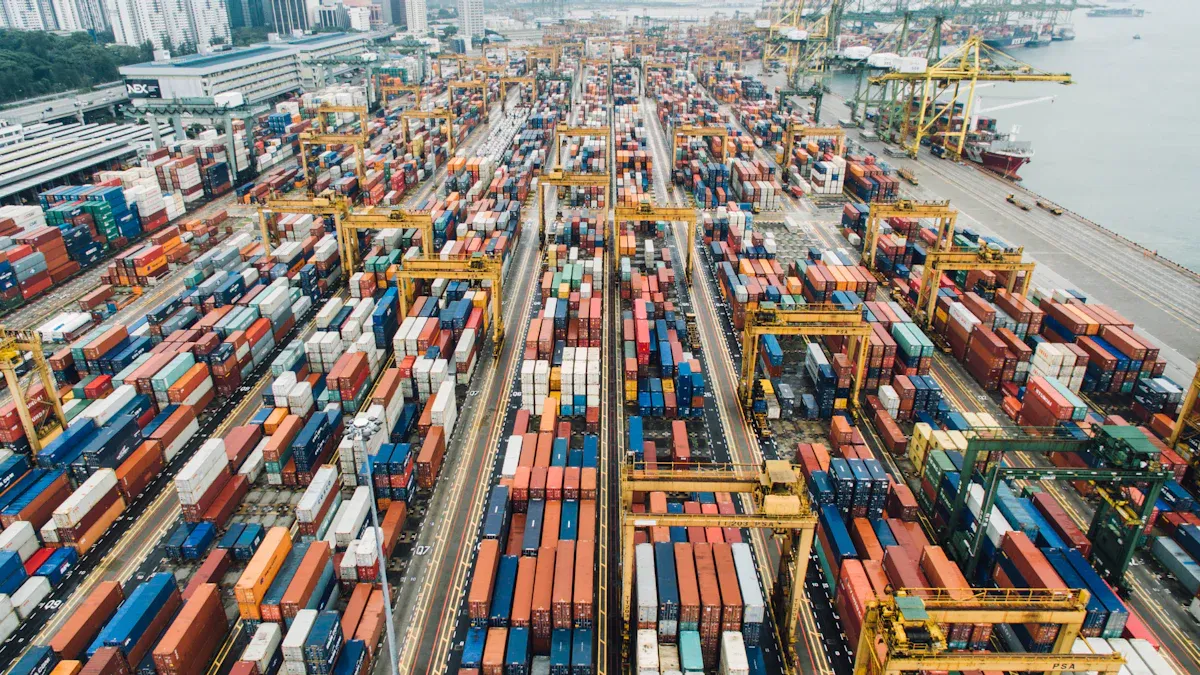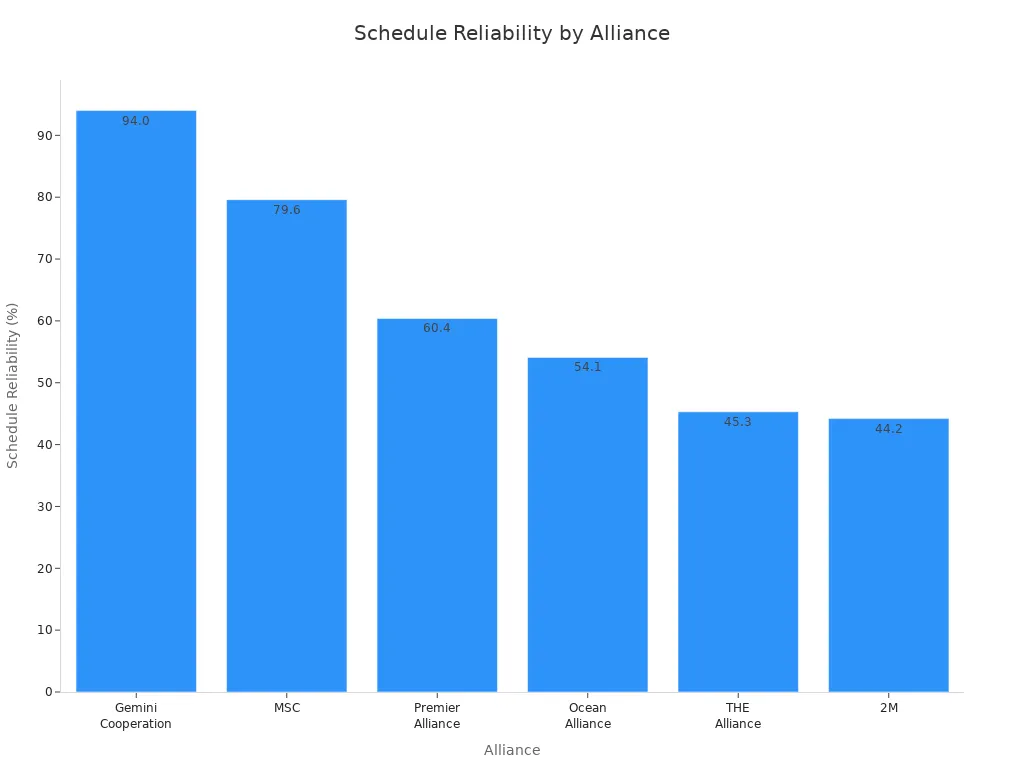PGL expands its global reach with new logistics alliances

PGL celebrates its 10th anniversary in 2025, marking a decade of steady growth and innovation. The company continues to build its international presence by forming strategic pgl logistics partnerships and alliances. Industry trends, including shifting economic factors and emerging global collaborations, shape these decisions. PGL adapts to changing conditions and remains focused on delivering value to customers worldwide.
Key Takeaways
PGL aims to expand its global presence by forming strategic logistics partnerships, enhancing service reliability and operational efficiency.
Investing in technology, such as real-time tracking and automated alerts, allows PGL to improve customer experiences and streamline operations.
PGL's alliances with key partners like CargoWise and MTU Maintenance enhance supply chain resilience and ensure timely delivery of critical services.
Adapting to industry trends, such as rising fuel prices and shifting sourcing strategies, helps PGL maintain flexibility and reduce operational risks.
Customers benefit from PGL's expanded network, gaining access to more shipping options and faster delivery times, which enhances overall satisfaction.
Expansion Strategy

2025 Vision
PGL sets ambitious goals for its next decade. The company plans to expand its global footprint by strengthening pgl logistics partnerships and alliances. Leaders at PGL focus on building resilient supply chains that can adapt to changing market conditions. They prioritize technology investments and operational efficiency. PGL aims to offer seamless service across continents, ensuring customers receive reliable solutions regardless of location.
Note: PGL’s vision for 2025 centers on agility and innovation. The company seeks to anticipate market shifts and respond quickly to disruptions.
PGL’s strategy includes diversifying sourcing options. Shippers now import less from China and more from other countries. This shift helps PGL reduce risk and improve supply chain resilience. The company also plans to invest in digital platforms that streamline communication with partners and customers.
Industry Trends
Several trends shape the logistics industry in 2024 and 2025. Companies face longer shipping routes due to ongoing military conflicts. These changes increase costs and challenge supply chain reliability. Labor disputes at US East Coast ports threaten to disrupt global alliances. Policy changes under a new US administration may complicate international trade.
Rising fuel prices drive up operational costs for logistics providers.
Increased shipping rates force companies to pass costs onto businesses and consumers.
Tariffs raise prices for goods, prompting transportation providers to adjust their rates.
Companies shift to domestic sourcing to avoid tariffs, tightening logistics capacity.
Shippers respond by diversifying supply chains and forming new partnerships. In 2023, 80% of companies reported that trading partners failed to uphold commitments. Nearly 29% plan to establish new business partnerships to enhance reliability.
Trend | Impact on Logistics Alliances |
|---|---|
Military conflicts | Longer routes, higher costs |
Labor disputes | Supply chain disruptions |
Policy changes | Complicated international trade |
Fuel price hikes | Increased operational expenses |
Tariffs | Adjusted sourcing strategies |
PGL adapts to these trends by focusing on collaboration and flexibility. The company leverages alliances to share resources and reduce expenses. This approach positions PGL to navigate industry challenges and deliver consistent value to its customers.
PGL Logistics Partnerships and Alliances

Key Partners
PGL works with several influential partners to strengthen its global network. In 2025, MTU Maintenance and TALA Aerospace stand out as key collaborators. Together, they manage a new spare parts warehouse in Fort Worth, Texas. This facility supports the supply of critical spare parts for aircraft engines. It also improves the supply chain for MTU’s global Maintenance, Repair, and Overhaul services. These partnerships help PGL deliver reliable solutions to the aviation industry.
PGL also maintains a strong relationship with CargoWise. This partnership brings advanced technology into daily operations. CargoWise automates workflows, which leads to smoother customer experiences. Customers receive timely notifications about their shipments. The system allows PGL teams to focus on personalized service instead of routine tasks. CargoWise also helps supervisors manage shipments and avoid delays. With CargoWise Neo, customers can manage their shipments independently. Real-time tracking and document visibility save time and reduce errors. These features improve both customer satisfaction and operational efficiency.
Alliance Scope
PGL logistics partnerships and alliances cover a wide range of services and regions. The company participates in major industry alliances, such as Premier Alliance, Gemini Cooperation, and Ocean Alliance. These alliances expand PGL’s reach and allow it to offer more flexible shipping options. By working with global partners, PGL can respond quickly to changes in the market.
Economic factors play a big role in shaping pgl logistics partnerships and alliances. Fluctuations in fuel prices, often caused by geopolitical events or OPEC decisions, create operational challenges. To manage these risks, PGL forms strategic partnerships and develops contingency plans. The company also diversifies its energy sources to handle sudden changes in fuel costs. Tariffs influence sourcing strategies and may lead PGL to adjust its alliances to keep costs under control.
Note: PGL logistics partnerships and alliances help the company stay competitive in a changing world. By working with trusted partners and using advanced technology, PGL can deliver reliable service even when economic conditions shift.
Partnership Type | Main Benefit | Example Partner |
|---|---|---|
Technology | Improved efficiency, visibility | CargoWise |
Aviation | Reliable spare parts supply | MTU Maintenance, TALA Aerospace |
Global Alliances | Expanded shipping options | Ocean Alliance, Gemini Cooperation |
PGL continues to invest in pgl logistics partnerships and alliances to support its growth. These efforts ensure that customers receive high-quality service, no matter where they do business.
Operational Impact
Service Enhancements
PGL continues to improve its services through strong logistics partnerships and alliances. These collaborations help the company share resources and optimize operations. For example, when companies like DHL and Walmart work together, they achieve better efficiency and lower costs. PGL follows a similar approach. By working closely with partners, PGL can deliver faster shipments and higher service quality.
Logistics alliances enable resource sharing.
They help companies use advanced technologies.
These efforts lead to cost savings and better customer experiences.
PGL’s focus on collaboration in the supply chain supports its goal to streamline operations. This approach helps the company stay competitive in a fast-changing market. When compared to other logistics providers, PGL faces a higher perceived default risk, but it continues to invest in building resilient supply chains. The table below shows how PGL compares to industry benchmarks:
Company | Average Credit Spread | Perceived Default Risk | Strategic Focus |
|---|---|---|---|
Crane Worldwide Logistics | 0.993% - 2.234% | Lower | Nimble, resilient supply chains |
Omni Logistics | > 7% | Higher | N/A |
PGL (Perimeter Global Logistics) | > 5% | Higher | N/A |
Technology Integration
PGL uses advanced technology to improve tracking, transparency, and automation. The company’s systems allow customers to monitor cargo in real time. Automated alerts notify users of any changes or issues. Fast customs clearance reduces waiting times at borders. PGL Connect offers real-time tracking with easy-to-use filters. Document management keeps all shipping papers in one place. In-app chat lets customers reach support quickly. Smart analytics help PGL make better decisions and improve shipping processes.
PGL logistics partnerships and alliances support these technology upgrades, making operations smoother and more reliable for customers.
Feature | Description |
|---|---|
Real-time tracking | Monitor cargo across borders |
Automated alerts | Prompt notifications for issues or changes |
Fast customs clearance | Shorter border wait times |
PGL Connect | Real-time tracking with filters |
Document management | Easy access to all shipping documents |
In-app chat | Quick communication with support |
Smart analytics | Informed decisions and improved shipping processes |
PGL’s commitment to technology and strong alliances ensures customers receive dependable and efficient service every step of the way.
Customer Benefits
Coverage Expansion
PGL’s new logistics alliances give customers access to a wider network. The company now connects more regions and shipping lanes. Customers can ship goods to new markets with fewer delays. PGL’s partners, such as Gemini Cooperation and Ocean Alliance, help expand this reach. These alliances allow PGL to offer more flexible routes and schedules.
Customers benefit from more shipping options.
Shipments reach destinations faster.
PGL’s network covers more countries and cities.
PGL’s partnerships also help customers avoid disruptions. When one route faces delays, PGL can quickly switch to another. This flexibility keeps supply chains moving. Customers gain confidence knowing their cargo can reach its destination, even during global challenges.
Reliability
PGL places a strong focus on reliability. The company uses advanced technology to track shipments in real time. GPS tracking and proof of delivery help ensure cargo arrives on schedule. PGL also trains workers and checks quality at every step. These actions protect shipments and build trust with customers.
PGL’s alliances have improved schedule reliability. The table below shows how different alliances perform:
Alliance | Schedule Reliability (%) |
|---|---|
Gemini Cooperation | 94.0 |
MSC | 79.6 |
Premier Alliance | 60.4 |
Ocean Alliance | 54.1 |
THE Alliance | 45.3 |
2M | 44.2 |

PGL stands out by focusing on on-time delivery, cargo safety, and customer satisfaction. The company follows ISO 9001:2015 standards and listens to customer feedback. Smart logistics tools help PGL keep shipments on track and safe.
Customers share positive experiences with PGL’s services:
They appreciate reliable delivery and dedicated support.
Many have learned that choosing cheaper options often leads to problems.
PGL’s commitment to reliability and coverage gives customers peace of mind. They know their shipments are in good hands, no matter where they need to go.
PGL’s new logistics alliances in 2025 set the company on a path for global growth. These partnerships improve reliability, technology use, and supply chain management.
Strategy | Implication |
|---|---|
Enhances reliability and capacity | |
Leverage technology | Improves supply chain visibility |
Segment cargo | Prioritizes critical shipments |
PGL faces challenges such as rising delivery costs, labor shortages, and evolving regulations. The company adapts by building strong alliances and investing in innovation. Other logistics firms can learn from PGL’s focus on collaboration and technology. This approach helps PGL stay ahead in a changing global market.
FAQ
What benefits do PGL’s logistics alliances offer customers?
Customers gain access to more shipping routes and faster delivery times. PGL’s alliances help reduce delays and improve reliability. These partnerships also provide better tracking and support.
How does PGL use technology in its logistics operations?
PGL uses advanced systems for real-time tracking and automated alerts. Customers can view shipment status and documents online. Technology helps PGL deliver accurate and timely updates.
Tip: Customers should use PGL Connect for easy shipment management and quick support.
Which industries benefit most from PGL’s partnerships?
Aviation, retail, and manufacturing industries see the greatest impact. PGL’s alliances support critical spare parts delivery, global sourcing, and efficient supply chains.
Industry | Key Benefit |
|---|---|
Aviation | Spare parts supply |
Retail | |
Manufacturing | Reliable sourcing |
How does PGL handle disruptions in global shipping?
PGL quickly switches routes and works with partners to avoid delays. The company uses smart analytics to predict problems and find solutions. Customers receive updates if changes occur.
See Also
PGL Transforms West Coast Trucking For Efficient Supply Chains
PGL's Warehousing Services Enhance Logistics In Miami And Los Angeles
PGL Delivers Dependable Trucking Options Across New York And Beyond
PGL Offers Reliable Warehouse And Fulfillment Services In California
